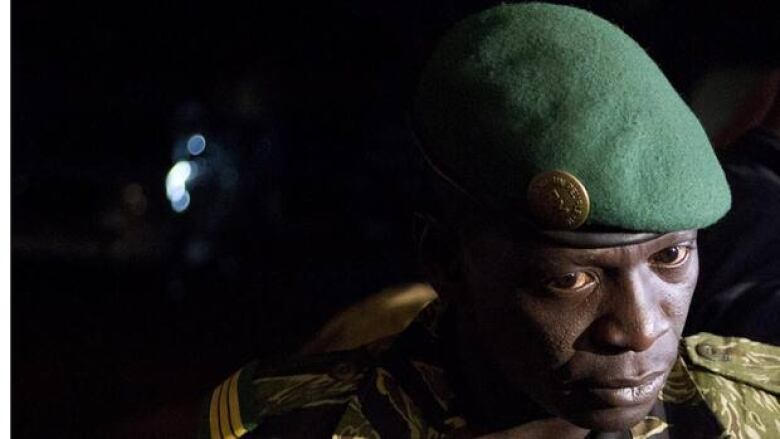Mali coup leader pledges to hand over power

Under intense pressure from the nations bordering Mali, the junior officer who seized control of the country in a coup last month signed an accord late Friday to return the country to constitutional rule.
The announcement was made only hours after separatist rebels in the country's north declared their independence.
Capt. Amadou Haya Sanogo emerged from his office inside the military barracks that has served the de facto seat of government for the past 16 days, ever since he and his men stormed the presidential palace, reversing over two decades of democratic rule.
Flanked by the ministers of neighbouring nations, he read out the accord, which states that under Article 36 of Mali's constitution the head of the national assembly becomes interim president in the event of a vacancy of power.
"In the event of the vacancy of the president of the republic for whatever reason, or due to any absolute and definitive impediment," Sanogo said, "the functions of the president of the republic will be exercised by the president of the National Assembly."
However, the accord did not say when the head of the assembly will assume the post, or how long the transition will last before new elections are held. Dioncounda Traore, the head of the assembly, fled Mali on March 21, the day that mutinous soldiers led by Sanogo seized control of the nation.
Canadian statement
Canada's Foreign Affairs Minister, John Baird, issued a statement on Thursday calling on coup leaders to step aside and warning that Canada and other partners are "exploring new measures" to make that happen.
The statement also said Canadians in Mali should leave the country.
The declaration was welcomed by Burkina Faso Foreign Minister Djibril Bassole, who flanked Sanogo while he read the accord. Bassole said afterwards that the nations bordering Mali had agreed to lift the crippling sanctions which went into effect earlier this week, including the closure of the country's borders. Landlocked Mali imports all its fuel, and already many neighbourhoods in Bamako had only 12 hours of electricity per day.
A senior official who was involved in the negotiations said that the head of the assembly would likely fly back as early as Saturday. He said that the accord means that Sanogo, who just days ago had stubbornly refused to step aside causing the sanctions to go into effect, has finally chosen to put the country back on a democratic path. However, a Western diplomat in Bamako said he hoped for the best, but worried that Sanogo could still make a U-turn. Neither the official nor the diplomat could be named because they had not been authorized to speak to the media.
"We have to take a wait-and-see approach," the diplomat said. "I certainly hope it's true and that the country goes back to civilian rule so that Mali can get back on its feet."
Rebels declare independence
The news comes just hours after Mali's Tuareg rebels, who seized control of the country's distant north in the chaotic aftermath of the coup in the capital, declared independence Friday of their Azawad nation.
"We, the people of the Azawad," they said in a statement published on the rebel website, "proclaim the irrevocable independence of the state of the Azawad starting from this day, Friday, April 6, 2012."
The move further complicates the crisis in Mali, as France, the European Union and the U.S. all issued statements saying they would not recognize the new Tuareg state. Earlier on Friday, the military chiefs of 13 of Mali's neighbors met to hash out plans for a military intervention to push back the rebels in the north.
The confusion in the capital created an opening for the rebels in the north, who have been attempting to claim independence for more than five decades.
The traditionally nomadic Tuareg people have been fighting for their own homeland since at least 1958, when Tuareg elders wrote a letter addressed to the French president asking their colonial rulers to carve out a separate nation called "Azawad" in their language. Instead the north, where the lighter-skinned Tuareg people live, was made part of the same country as the south, where the dark-skinned ethnic groups controlled the capital and the nation's finances.












_(720p).jpg)


 OFFICIAL HD MUSIC VIDEO.jpg)
.jpg)



























































































